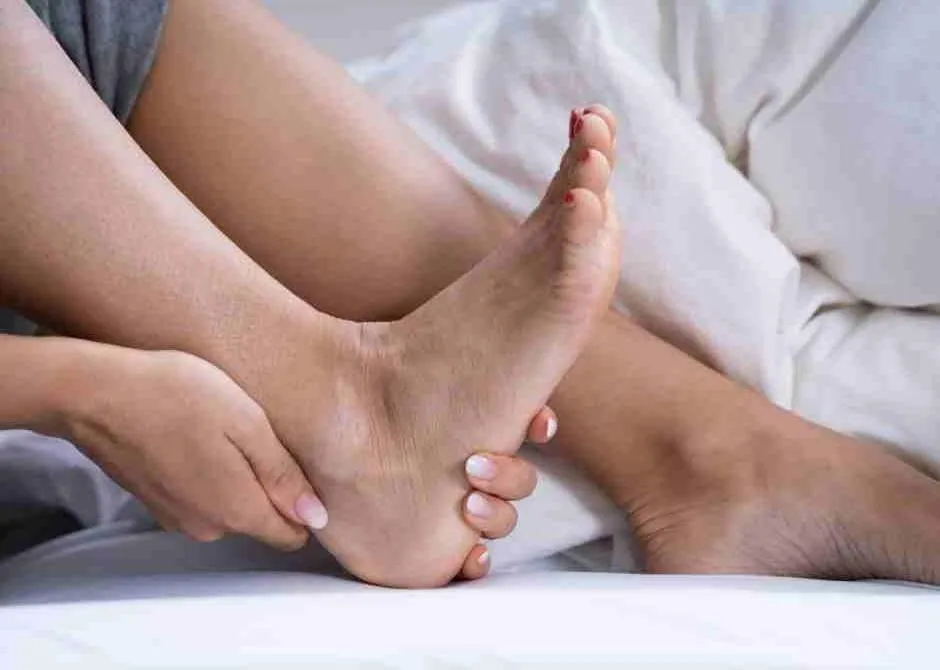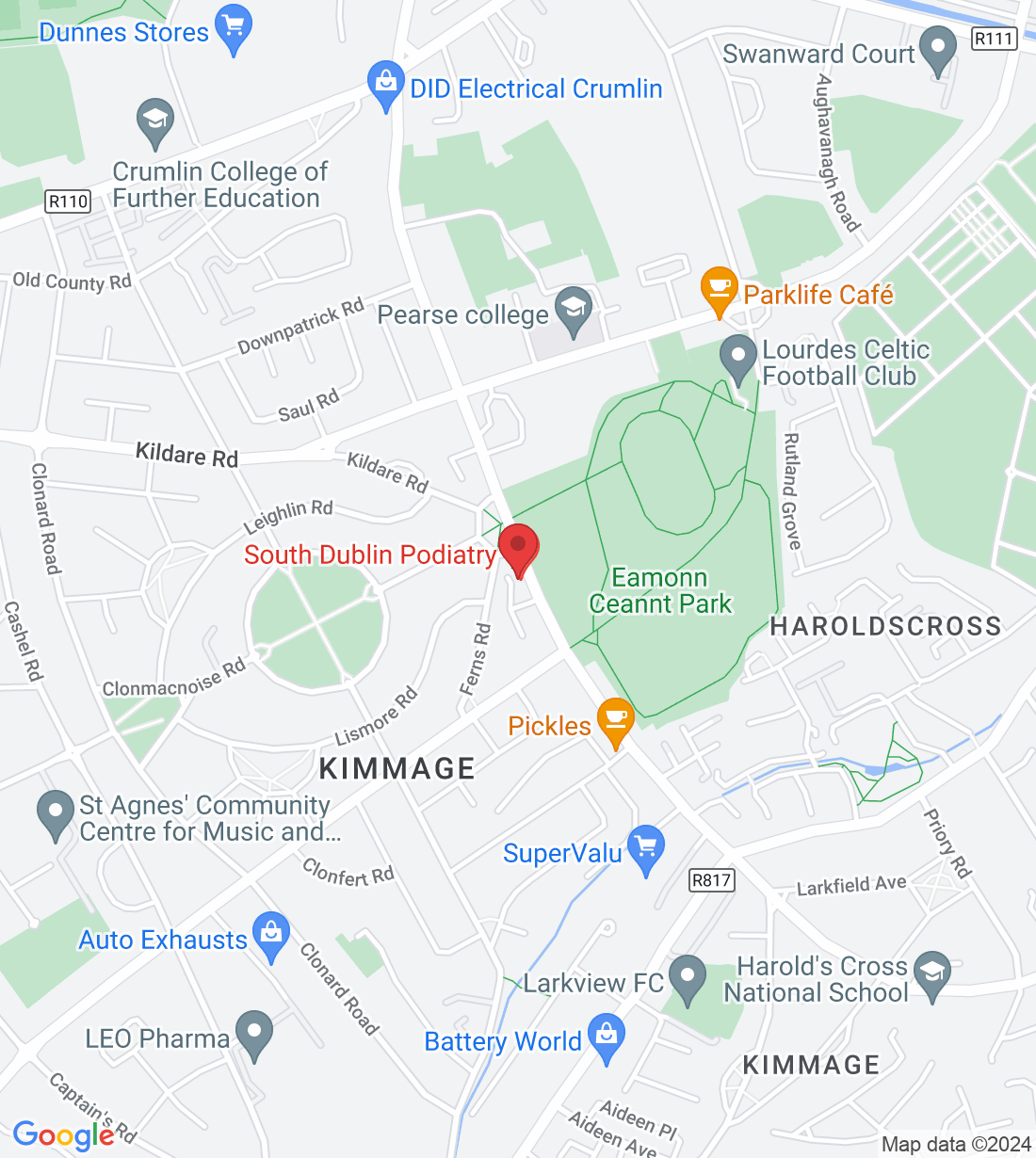Are You Looking For A Solution To Your Achilles Tendon Pain In Kimmage, Dublin 12?
Monday - Friday: 8:00am - 6:00pm
114 Sundrive Road, Kimmage, Dublin 12, D12 TDX8
Monday - Friday: 8:00am - 6:00pm
Free Parking Available


Download Your FREE Achilles Tendon Information Pack:
“4 Secrets To Solving Your Achilles Tendon Pain”
👇 Click the button below to get your FREE Report 👇
Does any of this sound familiar?
Do you experience pain in your Achilles when you get up in the morning or after sitting for a while?
Have you visited multiple clinics, but still can't find relief from your Achilles Tendonitis?
Have you invested a lot of money in treatment or orthotics that didn't fix your Achilles tendonitis pain?
Do you avoid walking because of the anticipated pain in your Achilles tendon?
Has it been recommended to you to receive an injection as the next step for your Achilles tendonitis?
"Have you started to worry that you will never get rid of your Achilles tendonitis and may never be able to do the things you love?"
If you answered YES to any of the above, you may have found the answer to your Achilles tendonitis pain at South Dublin Podiatry
Have Questions? Request a Call Back and Speak With Our Team of Achilles Tendonitis Experts

Fill in the form to request a Call From Our Team
One of our team members will call you for FREE and answer any questions or concerns you may have about your Achilles tendonitis
What Causes Achilles Tendonitis... And Why is Achilles Pain Not Getting Better?

Achilles tendonitis is a prevalent overuse injury that occurs due to repetitive stress on the Achilles tendon, which connects the calf muscle to the heel bone.
Symptoms of Achilles tendonitis include pain, tenderness, swelling, stiffness, and reduced range of motion in the back of the ankle.
This condition is most commonly observed in athletes, particularly runners, and often develops as a result of sudden increases in the intensity or duration of physical activity.

What Are the Symptoms of Achilles Tendonitis?
Achilles tendonitis manifests through symptoms such as pain, tenderness, swelling, stiffness, and reduced range of motion in the back of the ankle. The condition commonly affects athletes, particularly runners, and is caused by repetitive stress on the Achilles tendon. Recognising these symptoms is crucial for early detection and seeking appropriate treatment.
Symptoms of an Ingrown Toenail:
Pain and tenderness: You may experience pain along the back of the ankle, particularly near the heel. The pain may worsen with activity or when you press on the affected area.
Swelling: The Achilles tendon or the surrounding area may become swollen, leading to visible enlargement or a feeling of fullness.
Stiffness: You may feel stiffness in the Achilles tendon and surrounding muscles, making it difficult to flex or move your foot and ankle freely.
Reduced range of motion: Achilles tendonitis can limit the movement of your ankle, causing a decreased range of motion. You may find it challenging to fully extend your foot or point your toes downward.
Tenderness to touch: The affected area may be sensitive to touch, and pressing on the tendon may elicit pain.
It's important to note that the severity of symptoms can vary from mild discomfort to severe pain, depending on the extent of the tendon damage and inflammation. If you suspect you have Achilles tendonitis or are experiencing these symptoms, it's advisable to consult a healthcare professional for an accurate diagnosis and appropriate treatment.
Have Questions? Request a Call Back and Speak With Our Team of Achilles Tendonitis Experts

Fill in the form to request a Call From Our Team
One of our team members will call you for FREE and answer any questions or concerns you may have about your Achilles tendonitis
The South Dublin Podiatry Achilles Tendonitis Programme

Step 1 - Evaluation and Diagnosis
In the initial stage, a podiatrist will assess your symptoms, medical history, and perform a physical examination.
They may also order diagnostic tests like imaging (such as X-rays or ultrasound) to evaluate the severity of the condition and confirm the diagnosis of Achilles tendonitis.

Step 2 - Conservative Treatment
The next stage typically involves non-surgical or conservative treatment options. This may include:
Rest and activity modification: Reducing or avoiding activities that aggravate the condition.
Ice therapy: Applying ice packs to reduce pain and inflammation.
Nonsteroidal anti-inflammatory drugs (NSAIDs): Medications like ibuprofen to alleviate pain and inflammation.
Exercise therapy: Stretching and strengthening exercises, as well as other modalities like ultrasound or laser therapy, to promote healing and improve tendon flexibility.
Orthotic devices: Using shoe inserts or custom orthotics to provide support and reduce strain on the Achilles tendon.
Heel lifts: Elevating the heel to relieve tension on the tendon.

Step 3 - Recovery
Our goal is to provide treatments that are gentle and progressive, allowing you to recover from Achilles tendonitis and resume your favorite activities as quickly as possible, without experiencing any pain.
We want to help you overcome the limitations that your Achilles tendonitis pain has imposed on you, so that you can return to the things you love doing.
Also we don't just want to eliminate your Achilles tendonitis pain, we want to provide you with the knowledge and resources necessary to prevent it from returning in the future.
What Can I Do If Conventional Achilles Tendonitis Treatments Don't Work?
If conservative measures do not provide sufficient relief, a podiatrist may consider advanced treatment options, such as:
Extracorporeal Shockwave Therapy (ESWT): High-energy shockwaves are applied to the affected area to stimulate healing.
Platelet-rich plasma (PRP) therapy: Injecting concentrated platelets from your own blood into the tendon to promote healing.
Tenex procedure: Minimally invasive treatment involving the removal of damaged tissue using ultrasound-guided technology.
Surgical intervention: In severe cases where conservative treatments fail, surgical options like tendon debridement, repair, or lengthening may be considered.
It's important to note that the specific treatment plan will depend on the individual's condition and the recommendations of the treating podiatrist. It's always best to consult with a healthcare professional to receive personalised advice and guidance for the treatment of Achilles tendonitis.
Is The Achilles Tendonitis Pain Relief Programme Right for You?
Our team of podiatrists at South Dublin Podiatry are experts in treating Achilles Tendonitis pain, helping 1000's of patients get back to walking and running with relief from Achilles Tendonitis pain.
Here are just a few of the things our Podiatry Team can do for you:
We can help quickly relieve your pain and stiffness, often within just a couple of sessions.
On day one, we can inform you of what you have, why you have it, and how to get rid of it, so you can feel confident and informed about your treatment.
We can help you discover what's truly causing your Achilles tendonitis pain and address the root issue in as little as 20 minutes.
Our treatments can help give you more energy to enjoy each day to the fullest.
We can help you say goodbye to taking harmful painkillers long-term and find a more effective solution.
Our treatments can help you avoid surgery and painful injections.
We can help you skip the doctor's waiting room and avoid repeated visits to get more prescriptions.
We want to help you reclaim the quality time with family and friends that Achilles tendonitis may have taken away.
Our goal is to help you stay active and enjoy a fulfilling life, free from the curse of Achilles tendonitis pain.
What's next? You've got a decision to make ― another month gone without solving your Achilles tendonitis problem, or are you ready to get back to doing the things you love?
Are You Struggling With Achilles Tendonitis ? Take Us Up On One Of Our FREE Options
Option #1 (👍 most popular)

Option #2


6 Reasons To Choose South Dublin Podiatry
Highly qualified and experienced podiatrists: South Dublin Podiatry boasts a team of highly qualified and experienced podiatrists who are dedicated to providing top-notch foot and ankle care. Their expertise ensures that patients receive accurate diagnoses and personalised treatment plans tailored to their specific needs.
Comprehensive range of services: Whether it's treating common foot conditions like bunions, ingrown toenails, or plantar fasciitis, or addressing more complex issues such as sports injuries or diabetic foot care, South Dublin Podiatry offers a comprehensive range of services. Patients can trust that all their foot and ankle concerns will be addressed under one roof.
State-of-the-art facilities and technology: South Dublin Podiatry is committed to staying at the forefront of podiatry care by investing in state-of-the-art facilities and the latest technology. This allows for more accurate assessments, advanced treatment options, and enhanced patient outcomes.
Patient-centered approach: At South Dublin Podiatry, patients are the top priority. The team believes in a patient-centered approach, where they listen attentively to the concerns and goals of each individual. This ensures that the treatment plan aligns with the patient's lifestyle and preferences, leading to better compliance and results.
Holistic and preventive care: Beyond just treating existing conditions, South Dublin Podiatry emphasises the importance of holistic and preventive care. They educate patients on proper foot care techniques and lifestyle adjustments to minimise the risk of future foot problems, promoting long-term foot health and overall well-being.
Positive patient reviews and testimonials: The reputation of South Dublin Podiatry speaks for itself through the positive feedback and testimonials from satisfied patients. Many individuals have shared their success stories and experiences, highlighting the clinic's commitment to excellence and patient satisfaction.
Frequently Asked Questions About Achilles Tendonitis
What is Achilles tendonitis?
Achilles tendonitis is the inflammation of the Achilles tendon, which is the large tendon that connects the calf muscles to the heel bone. It is typically caused by overuse, repetitive strain, or sudden injuries.
What are the common symptoms of Achilles tendonitis?
Common symptoms of Achilles tendonitis include pain and stiffness in the back of the heel, swelling, tenderness, and difficulty walking or participating in physical activities. The pain may worsen with activity and improve with rest.
How is Achilles tendonitis diagnosed?
Achilles tendonitis is usually diagnosed through a physical examination by a healthcare professional. They may also review your medical history and may order imaging tests, such as an ultrasound or MRI, to confirm the diagnosis and assess the extent of the injury.
What are the treatment options for Achilles tendonitis?
Treatment options for Achilles tendonitis may include:
Rest and activity modification: Limiting or avoiding activities that exacerbate the symptoms and giving the tendon time to heal.
Ice and heat therapy: Applying ice packs to reduce inflammation and using heat therapy to promote blood flow and relaxation.
Pain medications: Over-the-counter pain relievers or prescription medications can help manage pain and reduce inflammation.
Physical therapy: Specific exercises and stretches to strengthen the calf muscles, improve flexibility, and promote healing of the tendon.
Orthotic devices: The use of shoe inserts or heel lifts to provide support and reduce strain on the Achilles tendon.
Night splints: Wearing a splint at night to keep the foot in a neutral position, which helps stretch the calf muscles and relieve morning stiffness.
Extracorporeal Shockwave Therapy (ESWT): A non-invasive treatment that uses shockwaves to stimulate healing in the affected area.
Platelet-rich plasma (PRP) therapy: A procedure that involves injecting the patient's own platelet-rich plasma into the injured tendon to promote healing.
How long does it take to recover from Achilles tendonitis?
Yes, there are several self-care measures that can help manage Achilles tendonitis symptoms, including:
- Resting and avoiding activities that worsen the pain.
- Applying ice packs to reduce inflammation and pain.
- Using over-the-counter pain relievers to alleviate discomfort.
- Performing gentle stretching exercises as recommended by a healthcare professional.
- Wearing appropriate footwear with good arch support and cushioning.
- Gradually increasing activity levels and avoiding sudden increases in intensity.
- Maintaining a healthy lifestyle, including regular exercise, a balanced diet, and adequate rest and recovery.
Can surgery be required for Achilles tendonitis?
In some cases, when conservative treatments fail to improve symptoms or for severe cases of Achilles tendonitis, surgical intervention may be considered. The specific surgical procedure will depend on the individual's condition and the recommendations of a healthcare professional.
How can Achilles tendonitis be prevented?
- Gradually increase the intensity and duration of activities to avoid overuse.
- Warm up before exercise and cool down afterward.
- Use proper technique and form during exercise or physical activities.
- Wear appropriate footwear that provides good support and cushioning.
- Avoid sudden changes in intensity or training surfaces.
- Listen to your body and take rest days when needed.
- Maintain a healthy weight to reduce stress on the tendons.
Remember, if you are experiencing persistent or worsening symptoms of Achilles tendonitis, it is recommended to consult with a healthcare professional such as a podiatrist, for an accurate diagnosis and appropriate treatment.
Have Questions? Request a Call Back and Speak With Our Team of Achilles Tendonitis Experts

Fill in the form to request a Call From Our Team
One of our team members will call you for FREE and answer any questions or concerns you may have about your aches and pains.



